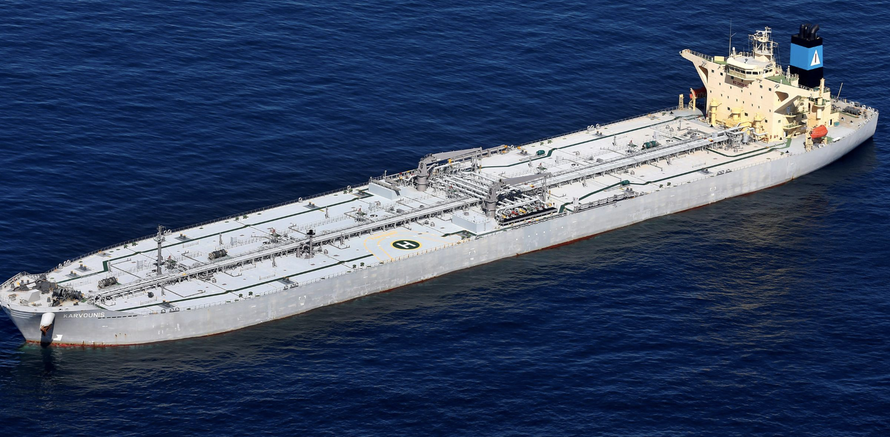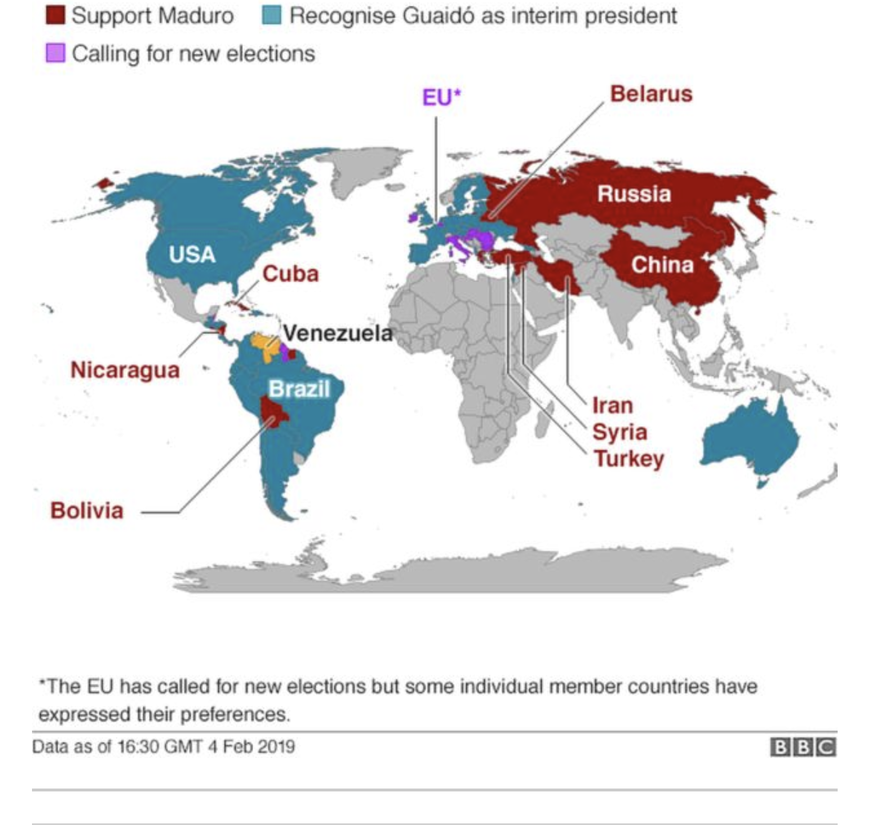An interesting comment I read as to what else has been done against Venezuela,
Do you have a link to that comment? I'd be interested to learn more about that. Thanks!
An interesting comment I read as to what else has been done against Venezuela,
An even more problematic idea driving current U.S. policy is the belief that financial sanctions can hurt the Venezuelan government without causing serious harm to ordinary Venezuelans. That’s impossible when 95 percent of Venezuela’s export revenue comes from oil sold by the state-owned oil company. Cutting off the government’s access to dollars will leave the economy without the hard currency needed to pay for imports of food and medicine. Starving the Venezuelan economy of its foreign currency earnings risks turning the country’s current humanitarian crisis into a full-blown humanitarian catastrophe.
That’s what began to happen in 2017. Last year, Venezuela’s export revenues rose from $28 to $32 billion, buoyed by the recovery in world oil prices. Under normal conditions, a rise in a country’s exports would leave it with more resources to pay for its imports. But in the Venezuelan case, imports fell by 31 percent during the same year. The reason is that the country lost access to international financial markets. Unable to roll over its debt, it was forced to build up huge external surpluses to continue servicing that debt in a desperate attempt to avoid a default. Meanwhile, creditors threatened to seize the Venezuelan government’s remaining revenue sources if the country defaulted, including refineries located abroad and payments for oil shipments.
US is not interested in helping. It is interested in doing things by Force and then sweeping everything under the rug. NO ONE is talking about Libya anymore. No one in MSM.Back in 2002, opponents of then-President Chávez called for a massive strike in the country’s oil sector. The strike brought oil production to a standstill and caused a double-digit recession in an attempt to get Chávez to resign. This event single-handedly convinced Venezuelans that they could not trust a political movement that was willing to destroy the economy in order to attain power. In a recall referendum held two years later, voters resoundingly backed Chávez.
The United States and the anti-Maduro opposition will not win the hearts and minds of Venezuelans by helping drive the country’s economy into the ground.
If Washington wants to show it cares about Venezuelans, it could start by providing help to those most affected by the crisis.The United States and the anti-Maduro opposition will not win the hearts and minds of Venezuelans by helping drive the country’s economy into the ground.
Economic war redux
By now it’s firmly established what happened in Caracas was not a color revolution but an old-school US-promoted regime change coup using local comprador elites, installing as “interim president” an unknown quantity, Juan Guaido, with his Obama choirboy looks masking extreme right-wing credentials.
Everyone remembers “Assad must go”. The first stage in the Syrian color revolution was the instigation of civil war, followed by a war by proxy via multinational jihadi mercenaries. As Thierry Meyssan has noted, the role of the Arab League then is performed by the OAS now. And the role of Friends of Syria – now lying in the dustbin of history – is now performed by the Lima group, the club of Washington’s vassals. Instead of al-Nusra “moderate rebels”, we may have Colombian – or assorted Emirati-trained – “moderate rebel” mercenaries.
Contrary to Western corporate media fake news, the latest elections in Venezuela were absolutely legitimate. There was no way to tamper with the made in Taiwan electronic voting machines. The ruling Socialist Party got 70 percent of the votes; the opposition, with many parties boycotting it, got 30 percent. A serious delegation of the Latin American Council of Electoral Experts (CEELA) was adamant; the election reflected “peacefully and without problems, the will of Venezuelan citizens”.
The American embargo may be vicious. In parallel, Maduro’s government may have been supremely incompetent in not diversifying the economy and investing in food self-sufficiency. Major food importers, speculating like there’s no tomorrow, are making a killing. Still, reliable sources in Caracas tell that the barrios – the popular neighborhoods – remain largely peaceful.
In a country where a full tank of gas still costs less than a can of Coke, there’s no question the chronic shortages of food and medicines in local clinics have forced at least two million people to leave Venezuela. But the key enforcing factor is the US embargo.

Would love to know who is behind these "Major food importers".


In another example of how US sanctions can halt global trade in a given asset, we pointed out on Monday how trading in Venezuelan bonds had virtually frozen, with not a single trade crossing the tape on Monday, following US sanctions, as even buyers and sellers in Europe have been de facto barred from trading the bonds.“There were many cargoes of Venezuelan crude already in the Gulf when sanctions were announced,” said a trader who deals with PDVSA. Others are stuck because holders “cannot find who to sell them to due to sanctions,” the trader said.
The tankers had been chartered by regular U.S. buyers of Venezuelan oil, including Chevron Corp, PDVSA’s refining unit Citgo Petroleum and Valero Energy, and trading houses that sell to refiners.
"Everybody is still working through the mechanics of things, still trying to figure out how freights are going to get paid and is sitting on the sidelines waiting for this to roll out," said one ship broker on Monday who was not authorized to speak publicly.
[...]
Separately, a few tankers that had waited for weeks to lift oil bound for U.S. customers left the Venezuelan port of Jose over the weekend without loading, according to Refinitiv data.
The oil fleet in Gulf waters grew as a bottleneck earlier formed around Venezuelan ports by tankers awaiting authorization to load. PDVSA has said it will only sell to certain customers that prepay for cargoes.
Outside of U.S. waters, there were also tankers loaded with Venezuelan crude and idling in the Caribbean and Europe, the Refinitiv data shows.
I think that's probably the most objective way of looking at the situation. I've listened to and read some criticism of Chavismo from previous supporters on the Left, as well as from libertarians who are totally anti-neocon but equally anti-socialist. The latter tend to argue that Chavez and Maduro made a mess of things with policies like the following:I really like his take on it, which is: Venezuela might’ve failed in their experiment, but it’s not up to the US to go and mandate, it should be up to the people in Venezuela.
That’s what it comes down to I think
I really like his take on it, which is: Venezuela might’ve failed in their experiment, but it’s not up to the US to go and mandate, it should be up to the people in Venezuela.
That’s what it comes down to I think.
I read that article, and have my doubts, not necessarily leads to shortages in the production side, depends also in the volume amount of sales of X product, in the article, the author exposed examples of disastrous consequences, but ... Liconsa, its a state-own enterprise company subsidized by the federal goverment (Mexico), that industrialize and commercialize milk bags at very low cost to feed very low income people, it had been operating since 1944. With its highs and lows, trying to use domestic producers and avoid importing milk.-price controls leading to shortages on the production side, which then requires subsidization that just produces more debt and hyperinflation (Maduro apparently has admitted these policies weren't successful, but hasn't proposed anything better) - see Price Controls Are Disastrous for Venezuela, and Everywhere Else | José Niño for example
https://mronline.org/2017/10/23/economic-warfare-in-venezuela/ said:Shortage, production, imports, delivery of foreign exchange and consumption
Shortage
According to economic theory, shortage in markets originates either due to an expansion of demand, which is not answered by an increase in supply, or a contraction of supply given a demand. In other words, if consumers demand more goods than they used to and there is no response from suppliers, there will be a shortage in the market (where more goods are demanded than those supplied).
The first manifestation of shortages, according to economic theory, are the queues (the first person to arrive buys the good); another manifestation is the displacement to a parallel market with higher prices (especially if they are goods whose prices are controlled); a third manifestation of shortages is the increase in prices in such markets (people are willing to pay more for the scarce good).
At this point, it is worth asking why consumers demand more quantities of a given good. Consumer theory clearly establishes the factors involved: either because consumer income increased,6 tastes have changed, or expectations have changed.
This last factor, of a mainly psychological nature, has largely explained the consumer behaviour in Venezuela in recent months. News and public opinion campaigns that seek to influence expectations have led to the expansion of demand for some goods.7 This demand will continue expanding as long as the “expectations” variable remains influenced by opinion campaigns.
If an expansion of demand in the market occurs and there is no response from the supplying agent or producers, or worse, the supply of the good in question shrinks, a greater shortage will be generated and, therefore, a greater pressure on the prices of these goods.
But why does supply shrink? Theoretically, it is due to a decrease in levels of production, or in the Venezuelan case, because the levels of imports of goods decreased, or because, even if goods are still produced or imported, they are not available in the markets, which is known as hoarding.
Shortage in Venezuela did not take place in recent months only, but rather is a phenomenon that we have seen with some intensity during the last several years. Figures from the Central Bank of Venezuela (BCV in Spanish) and the National Statistics Institute (INE in Spanish) indicate that shortages reached an average of 13.1% between 2003 and 2013.8
...
